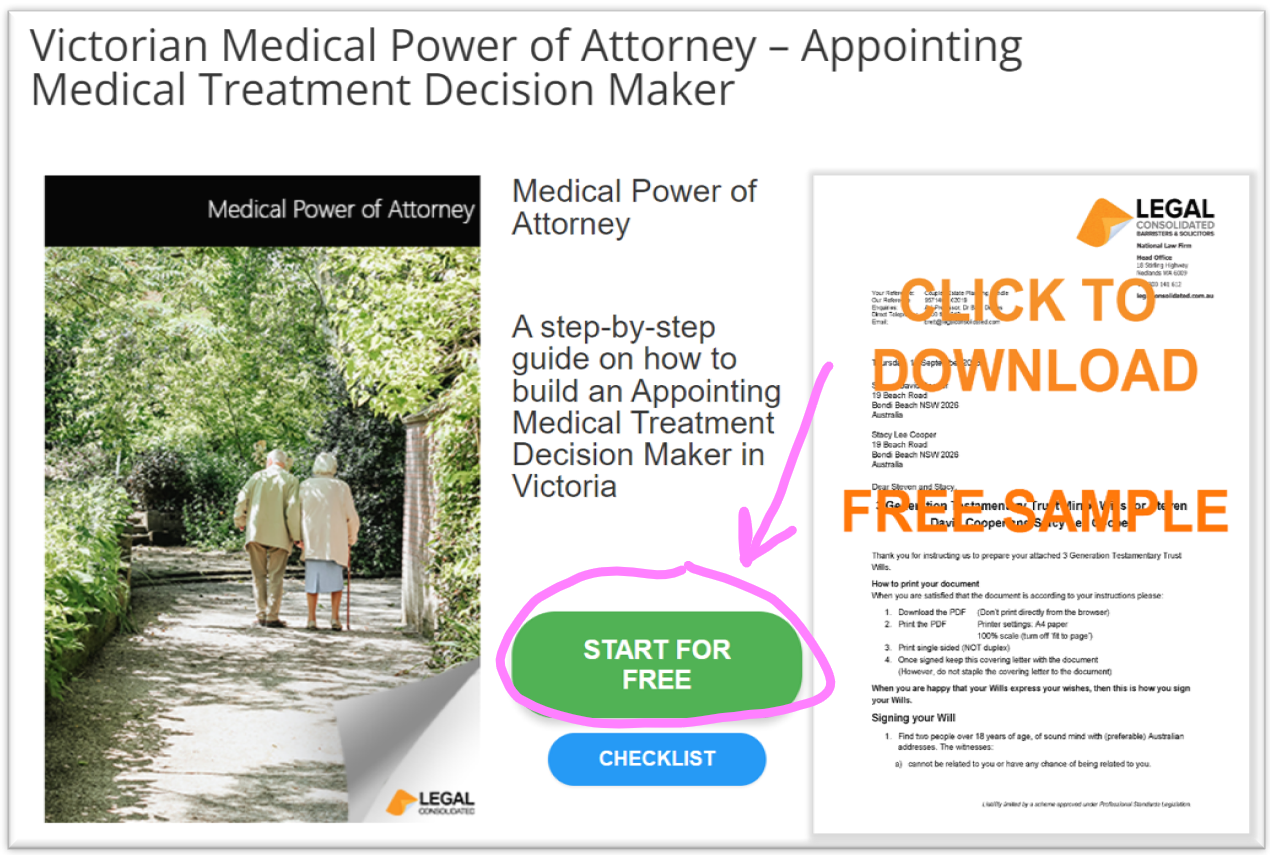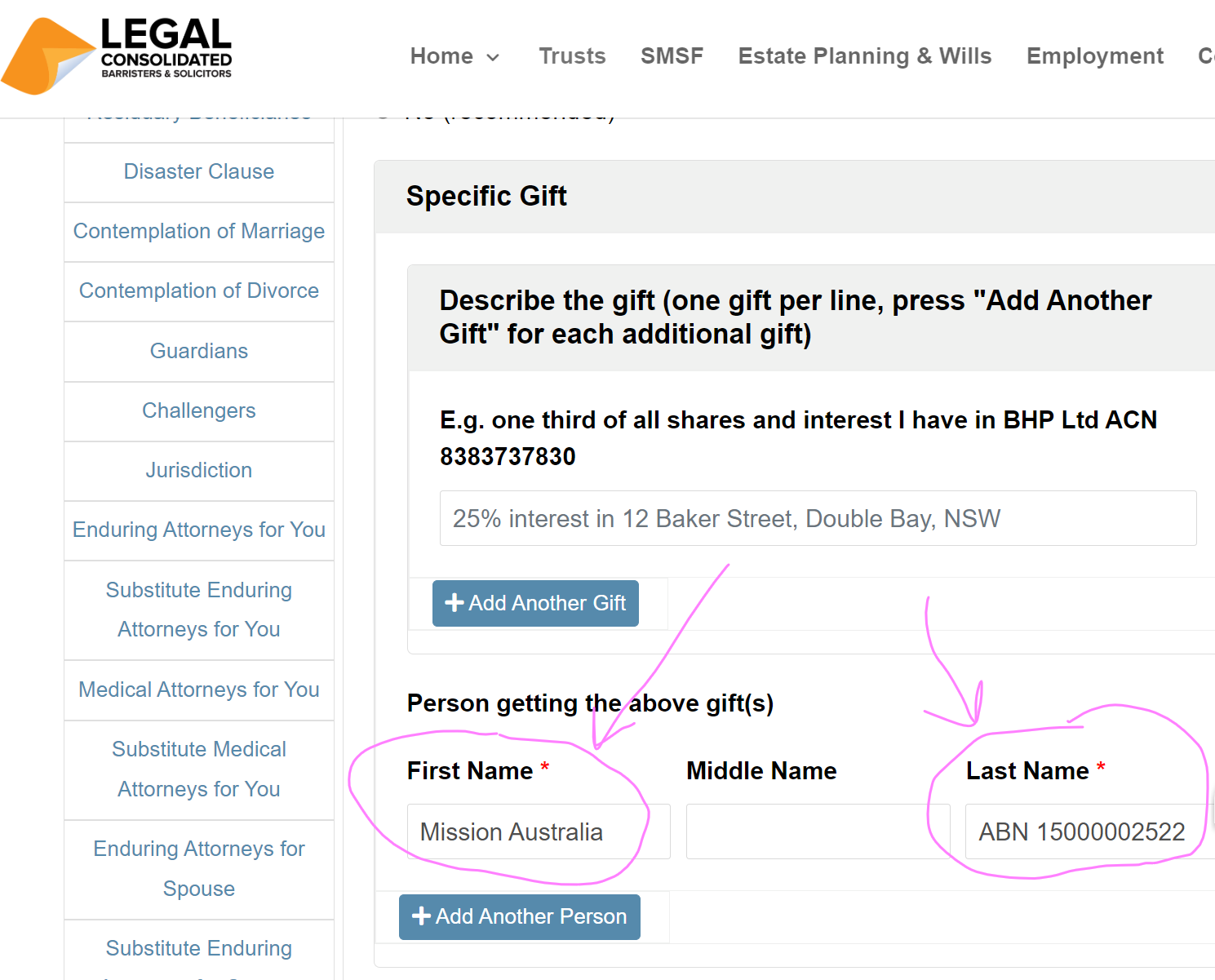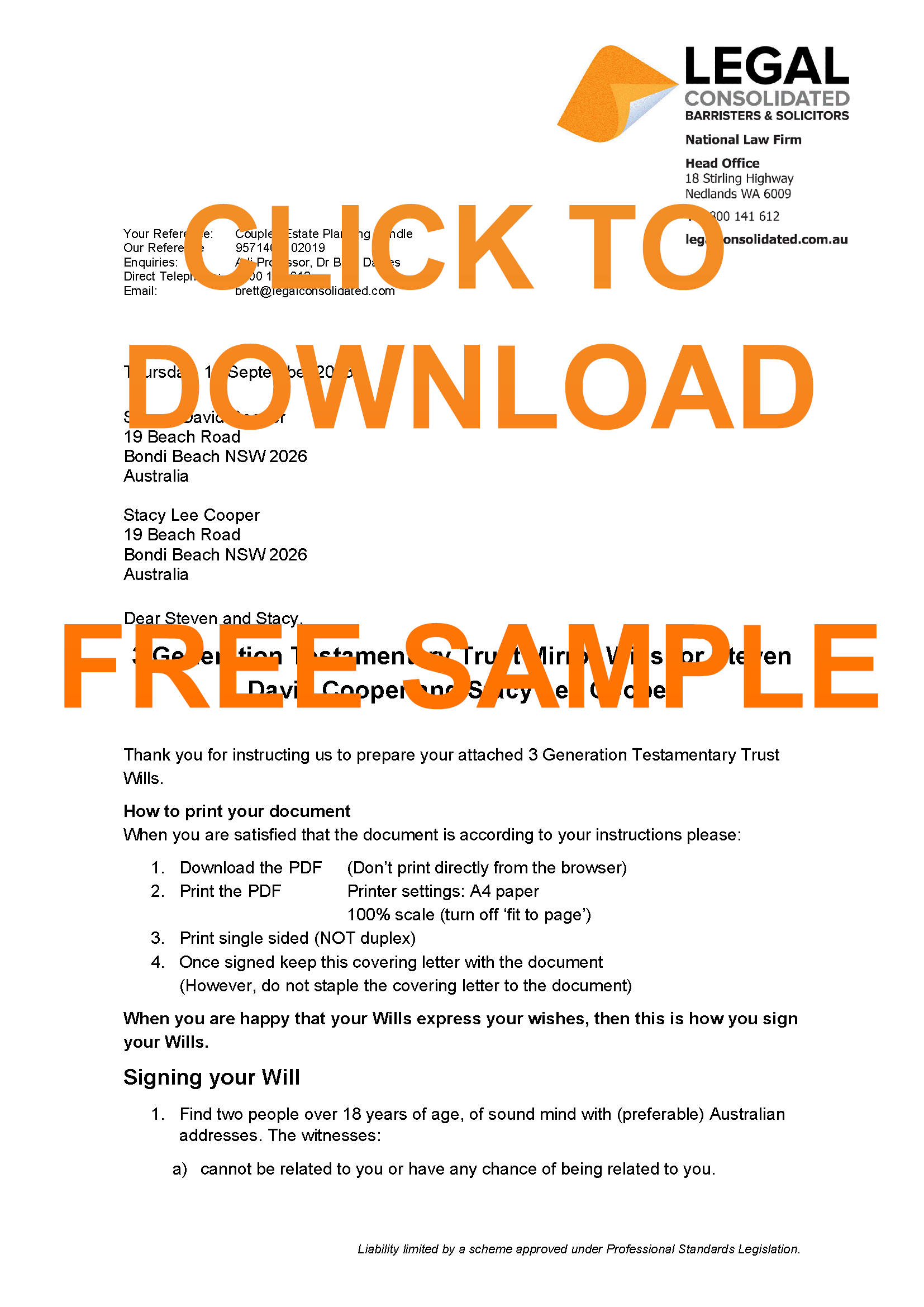
Medical Power of Attorney
$128 includes GST
-
Build a Appointing Medical Treatment Decision Maker for Victoria
Is the Medical Treatment Decision Maker an important deed?
The Victorian Appointing Medical Treatment Decision Maker document is an important legal deed in Victoria. This article explains how to prepare, sign and use the Victoria Medical POA. It shows the process of appointing a medical treatment decision-maker, the roles and responsibilities entailed, and the impact of such appointments on medical care.
What act of parliament allows for the Victorian lifestyle POA?
In Victoria, the ability to appoint a Medical Treatment decision-maker is governed by the Medical Treatment Planning and Decisions Act 2016, which came into effect in March 2018. This legislation allows you to proactively appoint someone who can make medical treatment decisions on your behalf while you cannot do so yourself.
Why prepare an Appointing Medical Treatment Decision Maker?
Navigating healthcare is daunting, especially during times of medical uncertainty and urgency. In Victoria, appointing a Medical Treatment Decision Maker is a proactive step to ensure your healthcare preferences are respected when you are unable to make decisions yourself. The free building process walks you through preparing and appointing a Decision Maker in Victoria. Legal Consolidated ensures clarity and peace of mind for you and your loved ones.
Vic Medical Power of Attorney – Appointing Medical Treatment Decision Maker in Victoria
In Victoria, who looks after you, when you cannot? The Victorian State Government? The retirement home? Medical doctors? Or your family? Should the Victorian government control your body? Do you trust your family more? If so build a Vic Medical POA. This is under the Powers of Attorney Act 2014 (Victoria). It is called an Appointing Medical Treatment Decision Maker.
What is the role of the Medical Treatment Decision Maker?
A Medical Treatment decision-maker is someone you legally appoint to make medical treatment decisions on your behalf. But only if you are unable to do so yourself. This role is crucial as it ensures that someone you trust can oversee your health care according to your wishes or best interests. Otherwise, medical doctors and nursing homes can run roughshod over your spouse, children and loved ones.
Wife Trapped in Victorian Retirement Home? Empower Yourself with a Medical Treatment Decision Maker
Our client’s wife, who suffers from Alzheimer’s Disease, was residing in a prestigious aged care facility. Upon attempting to move her, he was informed by the facility that he lacked the legal authority to do so. Distressed, he reached out to us. We recommended that he retrieve the Medical Treatment Decision Maker document his wife had prepared on Legal Consolidated’s website. With this document in hand, he was able to successfully secure her release from the facility.
Using Legal Consolidated’s Medical Treatment Decision Maker to escape a bad hospital
Our client was dismayed by the care his wife received in a Victorian hospital, where he felt the doctors acted more like deities than healthcare providers. Using the Victorian Medical Treatment Decision Maker they had built on Legal Consodlidated’s website, he intervened. We facilitated discussions with the hospital at no cost. With the legal authority granted by the document, he was able to transfer his wife to another hospital via ambulance, leaving the original doctors powerless to stop the escape.
The Legal Consolidated Medical Treatment Decision Maker can be updated for free – as often as you wish. It also comes with legal advice for you and the person you appoint.
Free advice to your Decision Makers for your entire life
When you build your Victorian Appointing Medical Treatment Decision Maker we help and advice your Decision Makers. This is included in the cost of building the Appointing Medical Treatment Decision Maker.
What can a Vic Medical Power of Attorney do?
The Victorian Appointing Medical Treatment Decision Maker allows you to appoint loved ones. If you lose mental capacity then they decide your:
- personal lifestyle
- where you live
- medical treatment
But only if you cannot make decisions yourself.
What decisions can a Victorian enduring guardian make?
Your Medical Treatment Decision Maker makes decisions about:
- where you live, whether permanently or temporarily
- who you will live with
- whether you work
- consent to medical & dental treatment
- protect life or ‘flick the switch when a vegetable’
- your education and training
- start, defend or settle legal actions
Does the Appointing Medical Treatment Decision Maker work outside of the State of Victoria?
A Medical Treatment Decision Maker document is created under the laws of Victoria. It only works in the State of Victoria. If you spend a lot of time living in, say, the Gold Coast with your children then also build a QLD Medical POA, as well.
Do I have to be 18 years old to make a Victorian Medical POA?
Yes, you must be 18 years of age before you can validly sign an Appointing Medical Treatment Decision Maker.
What is the youngest age that a person can accept and be a Victorian decision-maker?
With a Legal Consolidated Vic Lifestyle POA, you can appoint persons under 18 years of age, they cannot accept and cannot perform that duty until they turn 18 years of age and then accept the appointment in writing.
Do I have to live in Victoria to make a Victorian Medical POA?
You can live anywhere in the world and still make and accept an Appointing Medical Treatment Decision Maker deed. No requirement or nexus is required by the State of Victoria. However, the Victorian Medical POA only operates in Victoria. If you also live in, say Sydney, then you need a second NSW Medical POA – you can also build that on Legal Consolidated’s website.
What is the difference between a Victorian Medical Treatment Decision Maker and a NSW Power of Guardianship?
The concepts of appointing a Medical Treatment Decision Maker in Victoria and a power of guardianship in New South Wales (NSW) are similar in their intention to provide a means for individuals to ensure their personal and health care decisions are made according to their wishes when they are unable to do so themselves. However, they differ because they are creatures of different legislation.
1. Victoria vs NSW – Medical Treatment Decision Maker – different acts of parliament
-
Victoria: The appointment of a Medical Treatment Decision Maker is governed by the Medical Treatment Planning and Decisions Act 2016. This act allows Victorians and anyone else who wishes the protection in Victoria to appoint a decision maker specifically for medical treatment decisions.
-
New South Wales: The concept of a guardian, including what might be considered a power of guardianship, falls under the Guardianship Act 1987 (NSW). This act allows the appointment of a guardian who can make decisions regarding personal matters, including health care, but also broader life decisions such as where to live.
2. Scope of Decision-Making vs NSW Power of Guardianship
-
Victorian Medical Treatment Decision Maker:
- This role is specifically limited to decisions about medical treatment when the appointer is deemed unable to make those decisions themselves.
- It does not cover broader aspects of personal care or lifestyle decisions.
-
NSW Power of Guardianship (Guardian):
- A guardian in NSW can be given powers that extend beyond health care decisions to include broader lifestyle and personal decisions, like living arrangements and services.
- Legal Consolidated guardian’s authority is determined at the time of appointment and built for the specific needs and circumstances of the person they are representing.
3. Appointment Process of the Victorian vs NSW are different
-
Victoria:
- Individuals can appoint a Medical Treatment Decision Maker by completing and appropriately witnessing a formal appointment document on Legal Consolidated’s website.
- This process is designed to be straightforward, allowing people to ensure their medical care aligns with their preferences.
-
NSW:
- Guardians can be appointed in two ways:
- either on Legal Consolidated’s website; or
- through a NSW Civil and Administrative Tribunal (NCAT) court case. The court case is more involved, particularly if it goes through NCAT, which may determine the necessity and scope of guardianship based on evidence of the person’s needs.
- Guardians can be appointed in two ways:
4. Which Medical POA has greater Flexibility and Control – Victoria and NSW?
-
Victoria Medical Decision Maker:
- The appointment is specifically for medical decisions, providing a focused and clear directive for healthcare providers, medical doctors and retirement homes.
-
NSW Power of Guardianship:
- The role of a guardian can be more comprehensive, offering a broader protective measure but also requiring more careful consideration about the breadth of powers granted.
- Individuals can make enduring guardianship appointments that activate upon the individual losing capacity.
In summary, while both roles aim to protect individuals by ensuring that someone they trust can make crucial decisions for them when they cannot, the Victorian Medical Treatment Decision Maker is specifically tailored for medical decisions, whereas the NSW guardian can have authority over a wider range of personal and lifestyle decisions. This distinction is crucial for understanding how each role would function in real-world scenarios. Start the free building process by pressing Start for Free to see the full differences.
What is unique about the Victorian Medical Treatment Decision Maker?
A step-by-step guide to building an Appointing Medical Treatment Decision Maker
Step 1: Press Start for Free to build your Victorian Medical POA
- Press the Start for Free at the top of this page.

- Read all the free hints. Educate and empower yourself. Take control.
- When you have answered as many questions as you, telephone us to discuss your answers. But start the building process first as it answers most questions.
- Press Lock and Build, and within 60 seconds, you have the Victorian Lifestyle POA and the law firm’s cover letter on how to use the Appointing Medical Treatment Decision Maker.
Step 2: Free updates and advice for life on your Victorian Lifestyle POA
- You can update your Appointing Medical Treatment Decision Maker as often as you wish.
- You and the person you appoint get free legal advice on how to sign and use the Decision Maker – for life.
Step 3: Free advice on how to sign your Appointing Medical Treatment Decision Maker
- Print the document.
- Our cover letter outlines who and how to sign your Appointing Medical Treatment Decision Maker. Also, telephone us for free legal advice as well.
Step 4: Store the original signed Appointing Medical Treatment Decision Maker
- Keep the signed document in a secure location. Inform your decision maker of its location and consider giving them a photocopy.
- Legal Consolidated can arrange for your Victorian Medical Power of Attorney (POA) to be signed (at an additional cost) and stored (for free). Just email us on how to do that at lawyer@legalconsolidated.com.au
Step 5: Enjoy free updates on your Appointing Medical Treatment Decision Maker – for life
- Legal Consolidated provides free updates for the document throughout your lifetime. You and the individuals you appoint receive free legal advice related to the document, ensuring ongoing support and compliance.
Step 6: Free legal advice on your Appointing Medical Treatment Decision Maker
- Regularly review and update the document as your circumstances change.
- If your circumstances change or your attorneys need help, telephone us – for free
Legal Consolidated’s comprehensive service ensures that your Victorian is legally sound at the point of creation and remains relevant and effective throughout changes in your life and legal frameworks.
Register or lodge an Appointing Medical Treatment Decision Maker?
In Victoria, the ‘Appointment of Medical Treatment Decision Maker’ form is not registered with any government body. Therefore, store the original document securely and ensure that your appointed medical treatment decision-maker is aware of its location. Also, give them a certified copy.
Should I give my doctor a certified copy of the Victorian Medical POA?
Share copies with your doctor, relevant health practitioners, or hospital as needed. Certified copies are not very valuable because everyone wants to see the original. However, if you give someone the original, have them certify it themselves. Make sure you get your original back undamaged.
Upload the Appointment of Medical Treatment Decision Maker to My Health Record
Consider uploading a copy to your My Health Record so that healthcare providers can easily access it. Again, because it is electronic, it is not the original, so it may not be accepted.
Definition of words used in an Appointment of Medical Treatment Decision Maker
Get to know what these words mean. They will be thrown around, and you do not want to be the only person in the room who does not know what is happening.
| Term | Definition |
|---|---|
Advance Care Directive |
A document under the Medical Treatment Planning and Decisions Act contains binding instructions or preferences about medical treatment if the person cannot make decisions themselves. Legal Consolidated does not recommend taking the bait and doing one of these. They are rigid and do not keep up with medical advances. Better to let the person you appoint have full power to protect you. |
Advance Care Plan |
Documents expressing a person’s values and preferences for care and treatment. These are not made under the Medical Treatment Planning and Decisions Act. These are generally a waste of time and just motherhood statements that can inhibit the person you appoint. |
Appointed Medical Treatment Decision Maker |
A person appointed under the Medical Treatment Planning and Decisions Act. Recognised appointments made before this Act include:
Legal Consolidated has seen that valid interstate appointments are rarely recognised. If you live in two states, building a second medical/lifestyle POA is better. |
Health Practitioner |
A practitioner registered with the Australian Health Practitioner Regulation Agency (e.g., doctors, dentists), paramedics, and non-emergency transport staff under the Medical Treatment Planning and Decisions Act. |
Medical Treatment |
Includes diagnosing and treating physical or mental conditions, disease prevention, and improving comfort and quality of life. Examples include:
|
Medical Treatment Decision |
A decision to consent to or refuse medical treatment or research on behalf of a person without capacity. |
Medical Treatment Decision Maker |
A person authorised to make medical treatment decisions for a patient who cannot do so themselves under the Medical Treatment Planning and Decisions Act. |
Palliative Care |
Palliative care is not solely for end-of-life but focuses on improving quality of life and providing relief from suffering for people with serious illnesses, regardless of the stage of the disease. |
Enduring Power of Attorney |
Legal authority to make financial and/or personal decisions for someone else. Recognised under specific circumstances depending on the appointment date and purpose. This is a separate legal document that you can build here. Or better still, build your 3-Generation Testamentary Trust Will and POAs all at the same time here. |
Accommodation Provider |
A professional or administrator who is responsible for providing accommodation to an individual. |
Attorney |
A person appointed to manage financial or personal matters under an enduring power of attorney. (The term ‘attorney’ does not mean your lawyer.) |
Care Worker |
A person paid to provide care services. Excludes individuals receiving government carer payments or those considered health providers. |
Financial Matters |
Decisions related to financial or property affairs, including managing money, paying expenses, real estate transactions, and recovering money owed. |
Health Provider |
A person delivering healthcare as part of their profession or business. |
Legal Matters |
Use of legal services for the benefit of an individual, including court proceedings, hearings, and legal claims. |
Offence Involving Dishonesty |
An offence involving dishonesty that carries a penalty of at least three months’ imprisonment. |
Personal Matters |
Decisions about lifestyle and personal affairs, such as living arrangements and relationships. |
Principal |
The person granting authority in an enduring power of attorney. |
Relative |
Includes spouse, domestic partner, child, parent, step-parent, sibling, step-sibling, grandparent, grandchild, uncle, aunt, nephew, or niece. |
Protects from death duties, divorcing and bankrupt children and a 32% tax on super. Build online with free lifetime updates:
Couples Bundle
includes 3-Generation Testamentary Trust Wills and 4 POAs
Singles Bundle
includes 3-Generation Testamentary Trust Will and 2 POAs
Death Taxes
- Australia’s four death duties
- 32% tax on superannuation to children
- Selling a dead person’s home tax-free
- HECs debt at death
- CGT on dead wife’s wedding ring
- Extra tax on Charities
Vulnerable children and spend-thrifts
- Your Will includes:
- Divorce Protection Trust if children divorce
- Bankruptcy Trusts
- Special Disability Trust (free vulnerable children in Wills Training Video)

- Guardians for under 18-year-old children
- Considered person clause to stop Will challenges
Second Marriages & Challenging Will
- Contractual Will Agreement for second marriages
- Wills for blended families
- Do Marriages and Divorce revoke my Will?
- Can my lover challenge my Will?
- Make my Will fair: hotchpot clauses v Equalisation?
What if I:
- have assets or beneficiaries overseas?

- lack mental capacity to sign my Will?
- sign my Will in hospital or isolating?
- lose my Will or my home burns down?
- have addresses changed in my Will?
- have nicknames and alias names?
- want free storage of my Wills and POAs?
- put Specific Gifts in Wills
- build my parent’s Wills?
- leave money to my pets?
- want my adviser or accountant to build the Will for me?
Assets not in your Will
- Joint tenancy assets and the family home
- Loans to children, parents or company
- Gifts and forgiving a debt before you die
- Who controls my Company at death?
- Family Trusts:
- Changing control with Backup Appointors
- losing Centrelink and winding up Family Trust
- Does my Family Trust go in my Will?
Power of Attorney
 Money POAs: NSW, VIC, QLD, WA, SA, TAS, ACT & NT
Money POAs: NSW, VIC, QLD, WA, SA, TAS, ACT & NT
- be used to steal my money?
- act as trustee of my trust?
- change my Superannuation binding nomination?
- be witnessed by my financial planner witness?
- be signed if I lack mental capacity?
- Medical, Lifestyle, Guardianships, and Care Directives:
- Company POA when directors go missing, insane or die
After death
- Free Wish List to be kept with your Will
- Burial arrangements
- How to amend a Testamentary Trust after you die
- What happens to mortgages when I die?
- Family Court looks at dead Dad’s Will




